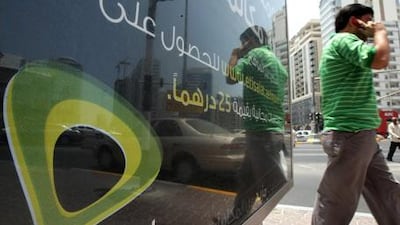Etisalat and du are on course to set their own prices for the first time, opening the door to cheaper phone bills for consumers but lower profits for the rival telecommunications operators. The Telecommunications Regulatory Authority (TRA) yesterday outlined proposed regulations that will free the companies from seeking the watchdog's approval before changing their prices.
The proposed regulations, which the TRA said could be enforced by the end of the year, would also prevent du and Etisalat from engaging in anti-competitive behaviour such as predatory pricing. "We have reached a stage where we have competitiveness in specific market segments [so] that we can publish a competition framework that will be effective," said Mohammed al Ghanim, the director general of the TRA. "It will have a serious impact in terms of how the TRA is looking at the sector."
The proposals mark a significant shift in the national telecoms market as the current regulatory system was designed by the TRA to prevent a price war between du and Etisalat. Removing the restrictions will allow both companies to compete freely. The TRA said that if it determined that a certain segment of the telecoms market, such as landline telephone service, was deemed to be competitive enough, it would let operators dictate how much a service should cost without seeking approval.
The TRA's framework is the first time a Middle East regulator has issued such a progressive scheme, drawing the country's sector closer in line with those in Europe, Australia and the US. "This is a natural track for regulators to follow when the market has reached a certain competition level that is agreeable to them," said Said Irfan, the telecoms research manager for IDC Middle East, Turkey and Africa.
Representatives from Etisalat and du declined to comment. The TRA said it planned to determine what parts of the telecoms market would be appropriate for deregulation by the end of the year. Before that, the regulator said it would conduct studies to evaluate economic conditions and define all areas of the country's telecoms market. "It doesn't follow that the licensees will be free of regulation, we just move into a different phase," said Fintan Healy, the executive director of regulatory affairs for the TRA.
Etisalat and du may begin to see revenues shrink as they continue to offer competitive promotions to keep subscribers happy. The long-term result, analysts suggest, may be a third telecoms operator in the UAE. "Operators don't want to engage in any price wars. It's not good for their bottom line, but if it reaches a balance the regulator might move to issue a new licence," Mr Irfan said.
"If the competition dynamic does not lead to enough benefit to the end users, they would have to add new competition." But Mr al Ghanim said the TRA had no plans to issue a licence to a third operator any time soon. He declined to provide a specific date when both operators would share each other's broadband networks and operate in each other's territory, only disclosing that it would occur this year.
The Burj Khalifa remains the only place in the UAE where residents can choose their internet and TV provider. The management consultancy Booz & Co issued a year-end report that forecast regulators will become more progressive as they try to maintain faster networks and new services. "Managing the interplay between the continued deregulation of retail and wholesale telecoms services and the renewed regulation of national networks will become a critical strategic capability for industry players that hope to succeed in this more highly regulated future," said Karim Sabbagh, a partner at Booz & Co.
At the ITU World Congress in Geneva last year, Mohammed Omran, the chairman of Etisalat, called for a review of telecoms legislation, particularly those relating to pricing, to help stimulate growth in rapidly changing markets. @Email:dgeorgecosh@thenational.ae

